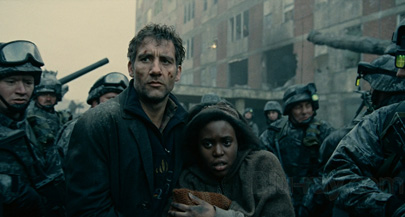10-Year Retrospective: Children of Men
By Ben Gruchow
December 20, 2016
All of this takes place against a crumbling, grey world that has utterly given up. The basic infrastructure of society still operates, but its operators are joyless in ways that suggest personal ruination; scarce is any hint that the film's occupants enjoy much in the way of hobbies or activities. The only pastime given much opportunity for explanation is Quietus, a drug that induces painless suicide (the box, glimpsed in the background and foreground of several scenes, denotes “You Decide When,” in a gallows-humor take on the ethereal marketing ethic of the pharmaceutical industry). What levity there is to be found in Theo's life is found via smoking marijuana and listening to music and jokes by Jasper (Michael Caine) at his cabin deep in the woods, but the pervasive reality of the world outside hangs over even these scenes like a cloud just out of frame. Insofar as we meet new individuals, they seem designed to make us write off this iteration of humanity - not because we want to, but because they're ready.
It's easy to forget that, at the time of its release, Children of Men was at least somewhat novel in its aesthetic and how it approached its subject matter. Here is a contemporary major studio film - the budget was $70 million, less than half of what the average tentpole cost back then while still being quite substantial in its own right - that is unabashedly grim and unfussy in its presentation of a murky and joyless world. Batman Begins had popularized the aesthetic of the “gritty” tentpole film the year before, but Children of Men represents what it looks like when taken to its most logical extreme. That it is not actually a nihilistic story - that it's a hopeful film, cloaked in an absolutely convincing outer shell of horrific remove - is a testament to Cuaron's grasp of tone.
The risk the movie takes of tipping over into conceptual silliness is less pronounced now than it might have been at release… and that is putting it mildly. Since 2006, we've been exposed to elements of isolationist nativism that now threatens to seat itself into positions of political power pretty much the entire developed world over; technology and social trends since 2006 have advanced to the point where the most inward-turning of sentiments toward outsiders are not just readily findable, but easily and frequently and repeatedly amplified. This needs no science-fiction context in narrative to hit us where we live. The world of Children of Men, where every action and word - seemingly every advertisement and occupation - is couched in weary resignation to running out the clock, may have relied upon a single apocalyptic event to drive its outlook, but the sentiment depicted is really just around the corner.
It is a narrative feat more remarkable than we might initially think that the people who live in this world are not grey and depressed ciphers but individuals still very much capable of reason and rationality and altruism. There is never a point in the film where this is not in evidence if you know where to look, but the first time the film's unique combination of future-shock cynicism and quiet, resistant hope comes into some evidence is a brief dialogue - fairly early on - between Theo and Julian. We find out that the two are estranged, formerly married, and they exchange what passes in this world for small talk: she heard about Theo's mother, and expresses her condolences. He asks if her parents were in New York “when it happened”; we saw earlier a state-sponsored propaganda video clip, briefly showing a shot of the Manhattan skyline with a mushroom cloud rising from it, and we understand that although the entirety of the film is set in a desolate Britain, it is not shy about communicating how utterly wasted the rest of the world is by comparison.
Theo is at first reluctant to help Julian and the Fishes smuggle Kee out of England, and in the context of their brief argument Julian educates him on the ringing sound he heard when the bomb went off in the café earlier. We know it as tinnitus; Julian, poignantly, describes it as the sound of cells dying. Once it's gone, he'll never hear that frequency again. “It's like their swan song,” she says. It isn't until later that we hear that ringing again, during a pivotal event in the film, and we realize that the sound is tied not to bombing, but to death and trauma.
And yet Julian's short speech, apocalyptic as it is in its own sense, conveys explicit character motivation for the first time. Moore has never been better than she is in the short amount of time she's on-screen here; she gives the rebels, an abstract concept until that point, a face and identity; more importantly, she earns our sympathy.
Continued:
1
2
3
|
|
|
|




